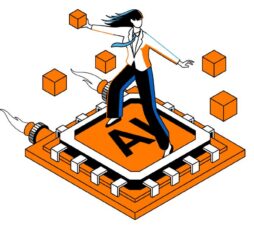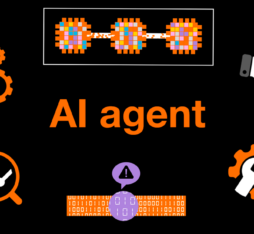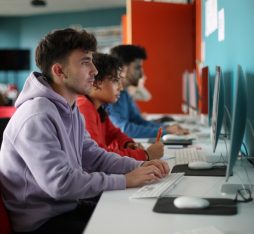“Providing better access to justice and bringing about augmented legal expertise.” ______________ “AI solutions that aim for a better understanding of ecosystems and biodiversity are of particular interest.”
Thanks to the major breakthroughs of these past years, in particular in the area of machine learning, artificial intelligence (AI) offers new perspectives. With Big data, the tenfold increases of calculation powers, or still the development of innovative algorithms, its applications are increasing and diversifying. From research in the health sector to energy savings, through the legal field, AI has begun to profoundly change many sectors and industries.
AI is driving medical research forward

Diagnostic assistance, computer-assisted surgery, companion robots, predictive medicine, forecasting an epidemic, etc. AI is at the heart of the healthcare of the future. As well as enabling better diagnoses and treatment of illnesses, it also offers the possibility of inventing new treatments. In effect, hospitals generate more and more medical data, of which only a small portion is used. AI makes it possible to gather and analyse these raw data in order to turn them into knowledge and thus speed up medical research.
In France, the Institut Curie, which is counting on Big data and AI to further advance the fight against cancer and to improve care, has been gathering patients’ medical data for over ten years.
In 2018, the French national institute of health and medical research (Inserm) joined forces with French startup Owkin, who specialise in machine learning applied to medical research, with the aim of enabling researchers to exploit the massive heterogeneous data produced and used by the institute, thanks to the Socrates software. This platform “uses machine learning technologies to analyze medical imaging libraries, genomic molecular data and clinical data sets in order to discover complex biomarker models associated with diseases or variable responses to treatments”.
To find out more:
Artificial Intelligence to serve health research: Inserm and Owkin join forces
AI to serve mental health

For several years, researchers have been looking into the diagnosis and treatment of mental illnesses. Among these is depression, which, according to the World Health Organisation (WHO), affects 300 million people worldwide. It is one of the main causes of handicap in the world.
Researchers at the Massachusetts Institute of Technology (MIT) in the United States recently presented a neural network capable of analysing raw textual and audio data from interviews in order to detect depression. The key innovation lies in the fact that the model can determine whether a patient is depressed by interpreting the words used and the way in which they are used. This is what researchers call a “context-free” analysis, because it is not based on answers to specific questions as is the case with other models. This means that the sequence modelling technique they have developed could be used to analyse natural conversations that take place outside of a formal interview with a clinician.
To find out more:
Model can more naturally detect depression in conversations
AI to decipher legal documents

AI’s progress is also transforming traditional legal practice. Beyond the fantasy of a Minority-Report-style predictive justice, this is about providing better access to justice and bringing about augmented legal expertise. Currently on the rise, legaltech refers to the use of technology to provide legal services and to the myriad startups who offer AI solutions aimed at legal professionals (the legal search engine Doctrine for example) as well as at SMEs and individuals.
Created in 2017, French startup Hyperlex wants to make law accessible to all – and less time-consuming – in the workplace. Its AI platform enables users to manage their contracts and legal documents. Thanks to machine learning, the tool analyses and automatically retrieves important information (clauses, key dates, amounts, etc.). It is capable of adapting to regulatory evolutions, of taking into account the variety of different national laws, whatever the company’s activity, and it can be used in many cases: analysis and everyday management of contracts, auditing, continued compliance, due diligence, etc.
AI to protect the environment

AI provides many opportunities for environmental conservation. “From reforestation by drones through mapping living species via the new possibilities provided by image recognition, AI is providing us with ever more numerous and powerful tools to truly enter into the ecological transition”, is to be read in the report by French mathematician and deputy Cédric Villani, entitled Donner un sens à l’intelligence artificielle (Giving meaning to artificial intelligence).
AI solutions that aim for a better understanding of ecosystems and biodiversity are of particular interest. For example, in 2017 Microsoft launched its AI for Earth programme, which awards grants to projects that use AI to improve knowledge and to address environmental issues in four areas: climate change, agriculture, biodiversity, and water. Within the scope of this programme the internet giant is organising a competition of innovative projects in partnership with the National Geographic Society.
Google is also investing in this area. The company has, for example, teamed up with the NOAA Pacific Islands Fisheries Science Center to exploit fifteen years of underwater recordings thanks to a convolutional neural network capable of identifying humpback whale calls. The aim: to better follow the movements of these cetaceans and to protect them.
To find out more:
Microsoft and National Geographic Society announce AI for Earth Innovation grantees
Acoustic Detection of Humpback Whales Using a Convolutional Neural Network
AI to make energy savings

Cédric Villani’s Donner un sens à l’intelligence artificielle report also highlights AI’s contribution to resource management optimisation, in particular that of energy. For example, smart grids or industry 4.0 use AI in conjunction with other technologies in order to make a city or company’s energy management more efficient by coordinating capabilities and requirements in the most efficient way possible. The AI of tomorrow will nevertheless have to consume less energy thanks to innovative solutions such as universal memory, which could reduce the electricity consumption of data centres by 20%.
French startup Sensing Vision helps its customers, and local communities in particular, to optimise their buildings’ energy efficiency thanks to solutions combining AI and the IoT. The pledge: to reduce energy consumption by 20 to 40%.
In practice, the facilities integrate sensors connected to a LoRaWAN network that take measurements in real time (temperature, humidity, light, attendance). These data are sent to a cloud platform where they are processed by AI algorithms and cross-referenced with other data such as the weather, occupancy timetable, etc. This makes it possible both to adapt the technical systems’ settings (heating, air conditioning) so as to better cater for requirements and to detect any potential malfunctions.
AI and tailor-made beauty

AI is also revolutionising the beauty industry, in particular machine learning and deep learning, which make it possible to develop very interesting applications (for example for diagnostics) based on facial recognition. The aim is to offer personalised advice and tailor-made cosmetics for beauty that adapt to all.
L’Oréal is very active in this area; its Research and Innovation department is developing technologies based on artificial intelligence to create “the cosmetics of tomorrow”. Furthermore, the Group supports “beauty tech” startups, and has already rolled out several applications for its brands. For example, in 2018 L’Oréal Professionnel launched Style My Hair, a 3D colour simulator allowing customers to test different shades before going to the hairdresser’s. This tool was developed in a partnership with ModiFace, who trained a deep neural network from 220,000 facial images. The Canadian startup, who specialise in the uses of augmented reality and artificial intelligence in the cosmetics industry, was recently acquired by the Group.
Together this year they launched SkinConsultAI, a skin diagnostic application based on artificial intelligence and scientific research on skin ageing carried by L’Oréal. “Using deep learning, L’Oréal explains on its website, the algorithm has been trained on 6000 clinical images from L’Oréal’s R&I evaluation and knowledge studies conducted with Skin Aging Atlases, and then a new model has been created on over 4500 smartphone selfies for 3 groups of women (Asian, Caucasian and Afro-American) in 4 different lighting conditions.”











